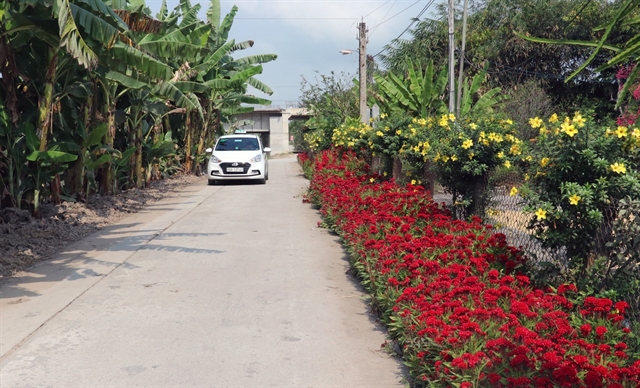
HCM CITY – Developing new-style rural areas has improved infrastructure and the lives of people in the Cửu Long (Mekong) Delta.
On average, the delta’s communes met 16.9 of the 19 criteria set under the national programme to build new-style rural areas at the end of last year, according to the Ministry of Agriculture and Rural Development.
The criteria cover infrastructure, transport, irrigation, electricity, the environment, income, education, healthcare, social security, and culture.
Also at the end of last year the delta had 70 per cent of its communes meeting all criteria, the ministry said.
In Cần Thơ City and Bạc Liêu Province, all are new-style rural communes.
As part of the programme, more infrastructure facilities, especially roads and irrigation works, have been built to boost agriculture and improve the lives of people.
The delta has also built 92,000km of irrigation canals, embankments, water supply works, fishing ports, and storm shelters for fishing boats under the programme.
Cà Mau Province has a dense river and canal network but poor road system when it embarked on the programme, and has built nearly 3,800km of rural roads, with all 82 communes now having roads.
In Sóc Trăng Province, the implementation of effective production models has helped the Khmer minority people improve their lives.
In its Vĩnh Châu Town, where more than 53 per cent of the population are Khmer, irrigation covers 80 per cent of farmlands. All communes have access to the national electricity grid and have excellent cultural, educational and healthcare facilities.
Sơn Ngọc Thạch, deputy chairman of the town People’s Committee, said: “The lives of people in especially difficult communes and hamlets have been improved and stabilised.”
In Kiên Giang, Lê Hữu Toàn, deputy director of the Department of Agriculture and Rural Development, said the province has developed various effective shrimp farming models like semi – intensive and intensive, shrimp – rice and marine aquaculture.
Danh Tâm, a farmer in Gò Quao District, said the programme has improved people’s lives in recent years.
Road, electricity, school, healthcare, cultural, market, water supply, and other infrastructure facilities have been built, he said.
“The Government has enabled farmers to participate in agricultural co-operatives for large-scale production.”
Last year the delta topped the country in producing rice, brackish water shrimp, tra fish, and fruits.
But it faces difficulties such as the impacts of climate change, small scale of agricultural production and lack of co-operation among agricultural stakeholders, according to the ministry.
OCOP products
Besides new-style rural areas, the delta has also developed a number of products under the country’s “one commune – one product” (OCOP) programme to increase their value and incomes for rural people.
OCOP includes commercial products and services, including food and beverages, handicrafts and rural tourism services. The delta has developed products based on its strengths such as rice, fruits, seafood, and eco-tourism.
The delta has nearly 700 OCOP products now, or 17.3 per cent of the country’s total, with Đồng Tháp, Sóc Trăng and Bến Tre provinces having the highest numbers.
Huỳnh Quang Đức, director of the Bến Tre Agriculture Extension Centre, said the products are part of effective models and should be strengthened and expanded.
They are promoting Bến Tre Province’s strengths, he added. – VNS
- Reduce Hair Loss with PURA D’OR Gold Label Shampoo
- Castor Oil Has Made a “Huge” Difference With Hair and Brow Growth
- Excessive hair loss in men: Signs of illness that cannot be subjective
- Dịch Vụ SEO Website ở Los Angeles, CA: đưa trang web doanh nghiệp bạn lên top Google
- Nails Salon Sierra Madre
 VnExpress News The News Gateway of Vietnam
VnExpress News The News Gateway of Vietnam





